|
|
|
Sort Order |
|
|
|
Items / Page
|
|
|
|
|
|
|
| Srl | Item |
| 1 |
ID:
124800
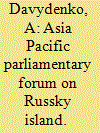

|
|
|
|
|
| Publication |
2013.
|
| Summary/Abstract |
THE 21ST ANNUAL MEETING of the Asia Pacific Parliamentary Forum (APPF), which took place in Vladivostok on Russky Island on January 27-31, 2013, has become the most representative meeting in the entire history of this international parliamentary organization, ending with the adoption of 14 resolutions on key issues of political, trade, economic, and humanitarian cooperation of the Asia-Pacific states.
|
|
|
|
|
|
|
|
|
|
|
|
|
|
|
|
| 2 |
ID:
152597
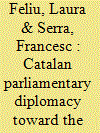

|
|
|
|
|
| Summary/Abstract |
This essay analyzes the diplomacy of the Parliament of Catalonia in the Autonomous Community of Catalonia, Spain, toward the Mediterranean region. In recent years, the academic literature has shown increased interest in the wide range of international activities undertaken by members of parliaments at the subnational level. Yet the academic study on diplomacy of the Parliament of Catalonia remains limited. Because there is a well-rooted tradition of foreign activity in the Catalan political culture, the Parliament of Catalonia has been working consistently in the international sphere. The Mediterranean dimension illustrates the strengths and the weaknesses of such activities.
|
|
|
|
|
|
|
|
|
|
|
|
|
|
|
|
| 3 |
ID:
152592
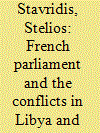

|
|
|
|
|
| Summary/Abstract |
The theory and practice of diplomacy has evolved greatly over the past few decades. Parliamentary diplomacy has become common practice, although there is an academic gap in its study, especially in the case of France. This essay aims to filling that gap: it shows how French parliamentarians have been active in foreign policy. First, they used the new concept of “responsibility to protect„ (R2P) in 2011 over Libya. Then, in the case of Syria, their main focus was on reacting to the 2013 use of chemical weapons by the Bashar al-Assad regime. Later still, after several Daesh terrorist attacks in Paris, they moved on to emphasize the right of “self-defense.”
|
|
|
|
|
|
|
|
|
|
|
|
|
|
|
|
| 4 |
ID:
151593
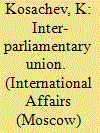

|
|
|
|
|
| Summary/Abstract |
"THE WORLD is made of achieved Utopias. Today's utopia is tomorrow's reality,"1 said Frederic Passy, winner of the first Nobel Peace Prize and one of the two co-founders (together with William Randal Cremer) of the oldest international parliamentary organization.
|
|
|
|
|
|
|
|
|
|
|
|
|
|
|
|
| 5 |
ID:
157260
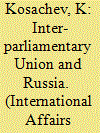

|
|
|
|
|
| Summary/Abstract |
ON OCTOBER 14, 2017, the 137th Assembly of the Interparliamentary Union (IPU), the oldest international political organization, will open in St. Petersburg. It may be recalled that the previous, 136th Assembly that took place in Dhaka, Bangladesh, preparations for which were widely covered in International Affairs,1 was truly historic for the Russian delegation. For the first time in 20 years, Russia initiated an IPU draft resolution on a very important and relevant subject, "The Role of Parliament in Respecting the Principle of Non-intervention in the Internal Affairs of States," receiving overwhelming support from the majority of national delegations and ensuring its adoption by consensus.
|
|
|
|
|
|
|
|
|
|
|
|
|
|
|
|
| 6 |
ID:
152591
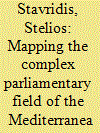

|
|
|
|
|
| Summary/Abstract |
Following the end of the Cold War and the appearance of globalization and new forms of regionalization, new actors have emerged in world politics and changed the traditional practice of diplomacy. New forms of diplomacy range from economic diplomacy to paradiplomacy, cultural diplomacy, or even celebrity diplomacy. Parliamentary diplomacy has also developed its influence in this new world, and there is now a clear “parliamentarization” of world politics. This phenomenon resulted from democratization, globalization, regionalization, and technological developments. There are now three different perspectives on diplomacy: statist (the state speaks with one voice), globalist (the growth of nonstate diplomacy), and postglobalist (combining both state-centric and multicentric realities). This essay falls clearly within the last of these three possibilities. It focuses on the growth of parliamentary diplomacy in the Mediterranean Basin.
|
|
|
|
|
|
|
|
|
|
|
|
|
|
|
|
| 7 |
ID:
065944
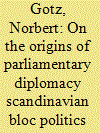

|
|
|
| 8 |
ID:
090068
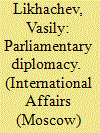

|
|
|
|
|
| Publication |
2009.
|
| Summary/Abstract |
The past few years have been a period of the mature, proactive and effective organization and evolution of such a process as parliamentary diplomacy. Being as it is an independent institution, it is closely integrated with all components of "classic" diplomacy where an exclusive role belongs to structures of the executive branch of government, primarily the foreign ministry. This situation has evolved from an array of circumstances related to the internal process of the development of states, their foreign policy course, and the carving out of a niche in the world order of the 21st century.
|
|
|
|
|
|
|
|
|
|
|
|
|
|
|
|
| 9 |
ID:
123906
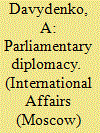

|
|
|
|
|
| Publication |
2013.
|
| Summary/Abstract |
THE VISITS to Mexico and Cuba by an official delegation of Russia's Federation Council led by its Speaker Valentina Matviyenko from May 14 to 17 this year were an integral part of the parliamentary dimension of the voluminous multi-vector foreign policies pursued by present-day Russia in the framework of an emerging multipolar international system based on equality, mutual respect and reciprocally advantageous cooperation.
|
|
|
|
|
|
|
|
|
|
|
|
|
|
|
|
| 10 |
ID:
152596


|
|
|
|
|
| Summary/Abstract |
The literature includes numerous analyses of the role played by regional organizations during the Arab Spring. However, the emerging role played by the Parliamentary Assembly of the Mediterranean (PAM), as the only truly intraregional pan-Mediterranean institution, has not been sufficiently explored. This essay helps fill this gap by assessing the parliamentary diplomacy activities performed by PAM vis-à-vis the Arab Spring countries between 2011 and 2016. A comparative perspective is adopted, using the literature on the European Parliament (EP) as the point of reference. This approach allows one to grasp how the EP and PAM have reacted to common problems and challenges affecting the Mediterranean and identifies possible overlaps and divisions of labor between the two international parliamentary institutions.
|
|
|
|
|
|
|
|
|
|
|
|
|
|
|
|
| 11 |
ID:
152594


|
|
|
|
|
| Summary/Abstract |
In the literature dealing with parliamentary diplomacy, the role that the European Parliament (EP) can play in the formation and conduct of European Union (EU) foreign policy is intensively studied. Yet analyses thus far have not dealt with how the EP can urge the EU and its member states to ensure foreign policy coherence. The essay aims to fill this gap. It draws on empirical data from the EP’s approach toward the Israel-Palestine conflict and aims to identify the ways the EP, although not directly and officially in charge of ensuring EU coherence, can contribute to promoting coherence in the EU’s foreign policy.
|
|
|
|
|
|
|
|
|
|
|
|
|
|
|
|
| 12 |
ID:
152593
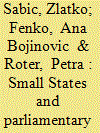

|
|
|
|
|
| Summary/Abstract |
The essay contributes to the scholarship on parliamentary diplomacy in the Mediterranean region through the lens of a small state: Slovenia. We argue that, because of limited resources, small states need to diversify their means of foreign policy to make their voices heard. Parliamentary diplomacy is a useful tool for representing Slovenian positions abroad. It enables focus on selected issues on the international agenda chosen together with the government and establishes continuous expert knowledge at the senior levels of parliament. However, it also exposes a small state’s limited capability to provide support for the parliament’s external relations. With specific reference to the Mediterranean, we find that there is considerable room for improvement, even with some evident obstacles, such as the lack of continuity in parliamentary representation.
|
|
|
|
|
|
|
|
|
|
|
|
|
|
|
|
| 13 |
ID:
167753
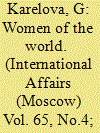

|
|
|
|
|
| Summary/Abstract |
THE RUSSIAN FEDERATION has always stood for a polycentric world order and for equal and indivisible security with unconditional respect for the sovereignty of nations and their right to choose their own path of development. At international and regional forums and during multilateral and bilateral negotiations, Russia has consistently promoted a constructive unifying agenda, including an agenda for sustainable social development and equal rights and opportunities for men and women.
|
|
|
|
|
|
|
|
|
|
|
|
|
|
|
|
|
|
|
|
|